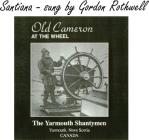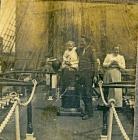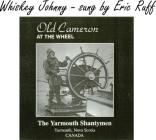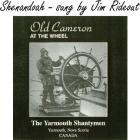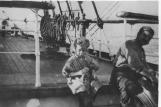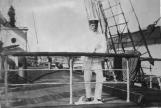1
Sea shanties were songs performed aboard sailing ships while doing the work of hauling up the anchor, hoisting sails, hauling on lines or pumping water out of the hold. The rhythm of the work was the same as the rhythm of the music and it made the work much easier as all the men were hauling or pushing at the same time thereby using a concerted effort.In her interview Kathryn Ladd was asked about sea shanties.
4
Q. Kathryn, what kind of memories do Sea Shanties bring back for you?A. Well, they bring back the men working on the vessel, and particularly, hauling the ropes to haul up the halyards and things like that, and also I can remember them at the capstan, but the actual words I don't remember. Now, whether that was because they were too far away, because they would be a hundred feet or perhaps away, you see, or perhaps because we would be inside, or whether it was just that I don't remember the song. I do remember the songs, but I don't remember the words.
8
Q. What kind of men worked on the ships?A. Well, all sorts of men. I mean there would be everything from sailors seriously working up to be an officer, or hopefully a Captain - there would be a few of those, but most of them were died hard world sailors of a pretty low type, of all ages and all nationalities. We had quite a few Norwegians, and some Italians. There would be a few Americans and English, too.
10
Q. Were you allowed to associate with these men?A. Well, there were two or three of the grandfatherly types that would kind of be my baby-sitters. I would get up early Sunday mornings, early, early, oh say six o'clock, because Matthew, who was an elderly sailor, whose duty it would be to clean brass, and I just loved to clean brass, so I would be given a rag and polish the brass. I thought it was a great deal of fun. But I didn't have much to do with the other sailors.
12
Q. Why was that?A. Well, they were a rough type, and their language may have been perfectly dreadful or they may have been considered dangerous - I don't know. But it was said so subtly that I was not aware of it until the last voyage. And then I used to love to paint for the sailors, and of course, this particular time I had picked out a young good looking one and the Mate came in and he said, 'Kathryn, you had better go below to your mother'. And I said, 'I don't want to, I want to paint.' I was rather spoiled, of course, being the only child on the boat, and everybody was awfully good to me. And he said, 'I will have to call your father.' That was enough. I got up and went in, you see, and mother said, 'Well, just stay for a little while.' In a little while I was allowed to go up and paint again, but Matthew, my old friend, was there painting you see, and the young chap was not anywhere near, so I was allowed to paint, but I didn't think that was half as interesting.
14
Q. What did your mother think of the sailors?A. Oh, she was very fond of the sailors. The 'Belmont' had the reputation of being a good ship, and of treating the men well and they said, 'Do you want to go on the 'Belmont', because there is a lady there and we get good food and we get good treatment there. The sailors knew that my mother would always stand up for the sailors. Not that my father was particularly cruel, in fact he wasn't, he was a very kind man. I thought the world of him. But you had to have complete discipline on the vessel. And if you didn't have discipline the men would take over, and there would always be a few very bad types there, and that is why mutinies started. But my father always had complete control, and if he spoke, the sailor said, 'Aye, aye, Sir,' and immediately did it, and I can remember once as a small child I was horrified, one of the sailors was knocked down because instead of speaking he was impertinent. What he said, I don't know, but the first thing I saw was the sailor lying on the floor, and that was against the rules, but nevertheless that was the way my father handled it. The next time that sailor spoke he tipped his head and said, 'Aye, aye, Sir.' There was no more trouble. But that was the way things had to be handled because there was no other way. There was only one law, one doctor, one everything, that was the Captain in charge of the vessel. And his word had to be law.
